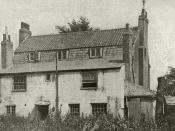The repentance of Moll in 'Moll Flanders' by Daniel Defoe, and the subsequent question surrounding the sincerity thereof, is a complex and widely debated subject. In many ways the journey that Moll travels is highly similar to the misfortunes and life that Daniel Defoe himself lived. In writing Moll Flanders, he is in many ways trying to find his own version of repentance. However in trying to persuade us of the mitigating circumstances and events that surrounded his and Moll's sins, one always has to wonder at the true sincerity of his repentance and thus that of Moll's.
Furthermore later during her first theft, Moll offers up to us a more supernatural explanation for her temptation to steal. She recalls that she was spurred on by something like a 'voice', and during her next theft, spurred by an 'evil counsellor within', and 'tempted by the same wicked impulse.
From this point on, Poverty has assumed a new role, controlling Moll in her crimes as opposed to being a mere influence on her actions. As Moll reflects on the theft, she conveys her apparent dismay to us that she had been 'reform'd' but would now be 'driven by the dreadful Necessity of my Circumstances to the Gates of Destruction, Soul and Body,' and after prayer, concludes that her past deeds were not 'sincerely repented of'. It is to all appearances as though Moll is being acted upon by outside influences, and thus Poverty and Sin appear to merge into a single prompting agent, apparently depriving Moll of any choice in the matter.
Throughout the passages in which Moll struggles with the temptations that pester her throughout the novel, there are some elements of doubt as to the sincerity of her repentance for her past life. While living...


